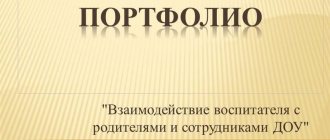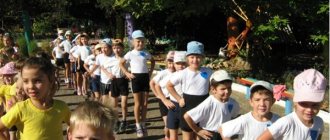Plan of interaction with preschool employees on issues of education, training, and development of children
Guzelia Medvedeva
Plan of interaction with preschool employees on issues of education, training, and development of children
In kindergarten, each specialist is assigned his own area of professional activity, which is aimed at diagnosing, preventing and correcting existing deviations in the child’s development in one or another educational field. Diagnostics allows not only to quickly monitor the process and dynamics of educational activities, but also to promptly correct them in the event of a possible negative impact on the health and mental development of the child.
Interaction between a teacher and a senior teacher at an educational institution.
The senior teacher organizes current and long-term planning of the activities of the teaching staff of the preschool educational institution. Analyzes the implementation of educational and methodological work and develops proposals to improve its effectiveness. The interaction between a teacher and a senior teacher at an educational institution is continuous throughout the entire educational process. The senior educator assists teaching staff in mastering and developing innovative programs and technologies, and helps prepare for certification. Measures are being taken jointly to equip groups with modern equipment, visual aids and technical teaching aids, and to replenish them with educational, methodological, fiction and periodical literature.
Work is being carried out to comply with the rules and regulations of fire safety, traffic safety, and behavior on the street in the educational process.
Interaction between a teacher and the music director of an educational institution.
The music director, together with the teacher, organizes and conducts music classes, literary and musical matinees. They identify musically gifted children and work with them individually and in groups. They conduct morning exercises, physical education and entertainment together, and provide musical accompaniment for organized children's games in the 2nd half of the day. Together with the teacher, they conduct musical, didactic, theatrical and rhythmic games. Consults teachers on problems of musical development. Get acquainted with the tasks of the work and the diagnostic results. Together with teachers, they develop and conduct: holidays, entertainment, and leisure activities. The music director helps the teacher in working with parents: prepares consultations at the request of the teacher, recommendations, memos.
Interaction between a teacher and a physical education instructor at an educational institution.
In kindergarten, a physical education instructor conducts physical education classes, together with the teacher, during diagnostics, they identify the physical abilities of children, plan individual work with lagging children, and monitor the physical activity of children during the day. Provides consultations to educators on the problem of motor development, training through open demonstration of motor activities with children. Talks with group teachers about organizing physical education classes. Together they develop and participate in physical education holidays, health days, summer recreational activities, and morning exercises. Provides assistance to educators in creating conditions in the group for the organization of motor activity, the physical development of children, the use of non-traditional equipment, and gives advice. Participates in parent meetings, in the preparation of visual information, and consultations for parents. Together with the teacher, they plan and implement various forms of physical education and recreational work: hikes, excursions, outdoor games, competitions.
Interaction between a teacher and a teacher-psychologist at an educational institution.
An educational psychologist plays an important role in organizing the educational process. The main work of an educational psychologist falls on the adaptation period, when a new team is formed. At this moment, she helps educators build relationships with newly arrived children and their parents. Individual work with children is jointly planned and the teacher-psychologist gives recommendations for further correctional and developmental work. Together they participate in organizing and holding various festive events. A teacher-psychologist provides the necessary psychological professional assistance to educators in order to prevent emotional burnout. Provides assistance to the teacher in the form of: consultations, seminars, surveys, design of visual material. Takes direct part in parent meetings.
Interaction between a teacher and a speech therapist at an educational institution.
A speech therapist works closely with teachers and attends their classes. Together with the teacher, they conduct relaxation, breathing, finger, articulation, and massage exercises with children, create and automate sounds, and develop phonemic hearing. In the afternoon, the teacher conducts individual work with children on the instructions of the speech therapist. A speech therapist teacher advises educators and parents on the use of special methods and techniques to assist children with developmental disabilities. Conditions for the development of various types of activities are jointly created in the group, taking into account the interests and needs of the children themselves.
Interaction between a teacher and a junior teacher at an educational institution.
The interaction between the teacher and the junior teacher occurs daily, throughout the entire day of the children’s stay in kindergarten, and includes:
• participation in planning and organizing the life activities of pupils, in conducting classes organized by the teacher;
• creation of conditions for socio-psychological rehabilitation, social and labor adaptation of pupils;
• together with medical workers and under the guidance of a teacher, ensuring the preservation and strengthening of the health of pupils, carrying out activities that promote their psychophysical development, and their compliance with the daily routine;
• organization, taking into account the age of pupils, their work on self-care, compliance with labor protection requirements, providing them with the necessary assistance;
• participation in work to prevent deviant behavior and bad habits among students;
• bearing responsibility for their lives and the health of children;
• dressing and undressing children, carrying out hardening activities;
• ensuring the protection of life and health of students during the educational process;
• compliance with labor protection and fire safety rules;
• ensuring the protection of children's lives, maintaining and strengthening their health;
• working together with children;
• interaction in work to improve the efficiency of the educational process and to create a favorable emotional climate for students in the group during their stay in a preschool institution.
Interaction between a teacher and a medical worker at an educational institution.
The interaction between the teacher and the medical worker is aimed at:
• control of the sanitary condition of the premises and area of the kindergarten;
• compliance with the sanitary regime as prescribed by the doctor, organizing activities to harden children;
• ensuring the organization of recreational activities, adherence to the daily routine, proper conduct of morning exercises, physical education classes and walks for children;
• accounting for sickness absence, isolation of sick children;
• there is a joint daily morning reception of children;
• participation in pedagogical councils devoted to the problem of physical development and health of children;
• health education work of parents;
• compliance with the group's food schedule;
• maintaining food sheets for children in the group;
• organizing meals in a group.
Modern goals and objectives of preschool education cannot be realized by each participant in the pedagogical process individually. All specialists should strive to have a unified approach to raising each child and a unified style of work in general. To ensure such unity in the work of all teachers and specialists, their close interaction is necessary.
The problem of raising and teaching preschool children with special educational needs is very acute and relevant today. As research by scientists shows, this process must be comprehensive and take place with the participation of specialists in various fields.
Successful overcoming of various mental disorders in children is possible by creating person-oriented interaction among all specialists of a preschool institution on an integrative basis. Around the child, through the joint actions of various specialists, a single correctional and educational space and a specific subject-development environment are created.
The following specialists work in our institution for this purpose:
Teacher-speech therapist, Tsalko Olga Pavlovna, specialist of the first category; 21 years of work experience;
Teacher-psychologist Nadezhda Andreevna Zorkaltseva, specialist of the highest category, 17 years of work experience;
Musical director Maogarita Mikhailovna Medvedeva; specialist of the highest category; work experience 28 years.
Musical director Tatyana Nikolaevna Volkova; specialist of the first category; 21 years of work experience;
Musical director Anastasia Aleksandrovna Kozintseva; young specialist, 4 years of work experience.
Physical education instructor, Elena Vladimirovna Afonasyeva, specialist of the highest category, work experience 24 years;
Senior nurse Anastasia Aleksandrovna Shandrygina.
To coordinate the work of specialized teachers and educators in order to organize their joint activities in order to improve the quality of education, coordinators for the interaction of all specialists are needed - this is the deputy head of educational work and the senior educator.
Organizing a system of methodological work with personnel in kindergarten is one of the important tasks of preschool education. In teaching teams, the role of the teacher - the main person closest to the child, if there are different specialists in the kindergarten, should remain leading. The problem of organizing interaction between a teacher and specialists to create conditions for the personality-oriented development of a child is relevant.
Why is this problem relevant? Working with children requires a lot of effort and energy from the entire teaching staff, so the main goal is to create a group of like-minded people. To do this you need to clearly know:
- which teacher is the main one in solving this or that problem in the upbringing and development of children;
- with whom he interacts;
- what is the share of participation of everyone else.
The deputy head of education and management and the senior teacher take an active part in clarifying the job responsibilities of narrow specialists, determining the forms and methods of their interaction with each other, taking into account the age characteristics of children. Thus, the performer is assigned very specific tasks and responsibilities, which are under the control of the methodological service. There must be certainty: who is doing what and by when, and interacting with whom. It is the interaction of all specialists that is considered as a condition for the development of a kindergarten.
Subject specialists, professionally engaged in one of the areas of preschool education, experimenting, finding and introducing new teaching technologies, have a greater opportunity than educators to study in specialized courses. Therefore, a specialist can methodologically competently advise educators on his section of the program.
The purpose of the work is to create a model of interaction between teachers, parents and medical personnel in the process of correctional and developmental educational activities, to remove contradictions, change parental attitudes, increase the professional competence of teachers and train parents in new forms of communication and support for the child, organize a subject-based correctional and developmental environment that stimulates child development.
The content and structure of pedagogical support largely depends on the diagnosis, structure of the defect, compensatory capabilities of the child, “the zone of his current and immediate development,” and a person-oriented approach.
Therefore, the model of correctional and developmental activity is an integral system. Its goal is to organize the educational activities of an educational institution as a system that includes diagnostic, correctional, developmental and preventive aspects that ensure a normal level of intellectual and mental development of the child.
The content of correctional and developmental activities is built taking into account the leading lines of the child’s development and ensures the integration of the child’s speech, cognitive, environmental, artistic, aesthetic and physical development. The implementation of this goal is ensured by the flexible use of traditional and non-traditional means of development.
The system of correctional and developmental activities provides for individual, subgroup and frontal classes, as well as the child’s independent activity in a specially organized spatial environment.
Achieving effectiveness in correctional and developmental work is possible through the interaction of all participants in the pedagogical process and in the joint solution of educational, educational and correctional tasks.
Uniformity of approaches to working with children, continuity in requirements, as well as in the content and methods of correctional, educational and educational work, complexity and diversity of means for developing children and eliminating their deficiencies, using the leading type of activity is the key to success in work.
The material was prepared by the deputy head of educational work, T.V. Koreneva.
Psychological mirror
Forms of interaction between
a teacher and a psychologist and speech therapist:
– joint diagnosis of children at different age stages;
– creation of a development environment;
– building individual development routes for children;
– participation in the “Psychology Week”;
– participation in workshops, trainings, consultations and other events conducted by a psychologist and speech therapist in kindergarten;
– organization of joint exhibitions, competitions for children and parents;
– planning and carrying out joint work with parents.
Forms of interaction between teacher and nurse:
– analysis of children’s medical records;
– taking into account the individual health characteristics of children when organizing classes;
– organization of space in groups of preschool educational institutions;
– joint maintenance of a health journal;
– organization of physical activity of children during the day.
Forms of interaction between the teacher and the music director:
– joint preparation and conduct of cultural and leisure activities;
– studying the repertoire for conducting classes;
– joint organization of work with parents;
– work planning;
– joint scientific and practical activities to introduce the regional component into the educational process;
– creation of a development environment
When providing assistance to a special child, coordination of the activities of all specialized specialists of the educational organization is required. Interaction should be carried out both in work with the child himself and with his parents. Interaction can be carried out within the framework of PMPC or ongoing work.
Also, the types and forms of interaction must be recorded, for example in such tables.
Journal of interaction between a teacher-psychologist and specialized preschool educational institutions specialists in the 20___–20___ academic year.
| Deadlines | Interaction with a speech therapist | Interaction with a physical education instructor. | Interaction with music directors | Notes and progress marks. |
| 1st quarter | ||||
| 2nd quarter | ||||
| 3rd quarter | ||||
| Summer wellness period |
Journal of interaction between a teacher-psychologist and educators in the 20___ – 20____ academic year.
| Groups | 1st quarter | 2nd quarter | 3rd quarter | Summer wellness period | ||||
| Psychologist for teacher | Teacher to psychologist | Psychologist for teacher | Teacher to psychologist | Psychologist for teacher | Teacher to psychologist | Psychologist for teacher | Teacher to psychologist | |
| 1 | ||||||||
| 2 | ||||||||
| 3 | ||||||||
| 4 | ||||||||
| 5 | ||||||||
| 6 | ||||||||
| 7 | ||||||||
| 8 | ||||||||
| 10 | ||||||||
| 11 | ||||||||
| 12 | ||||||||
This table presents other interaction options.
| Teacher - psychologist | Teacher speech therapist | Physical education teacher | Musical director | Medical staff | Educator |
|
|
|
|
|
|
Views 621, Today 4



